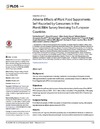Identificador persistente para citar o vincular este elemento:
https://accedacris.ulpgc.es/jspui/handle/10553/52617
| Título: | Adverse effects of plant food supplements self-reported by consumers in the PlantLIBRA survey involving six european countries | Autores/as: | Restani, Patrizia Di Lorenzo, Chiara Garcia-Alvarez, Alicia Badea, Mihaela Ceschi, Alessandro Egan, Bernadette Dima, Lorena Lüde, Saskia Maggi, Franco M. Marculescu, Angela Milà-Villarroel, Raimon Raats, Monique M. Ribas-Barba, L. Uusitalo, Lourdes Serra-Majem, L. |
Clasificación UNESCO: | 3206 Ciencias de la nutrición 3209 Farmacología |
Fecha de publicación: | 2016 | Publicación seriada: | PLoS ONE | Resumen: | Background The use of food supplements containing botanicals is increasing in European markets. Although intended to maintain the health status, several cases of adverse effects to Plant Food Supplements (PFS) have been described. Objectives To describe the self-reported adverse effects collected during the European PlantLIBRA PFS Consumer Survey 2011-2012, with a critical evaluation of the plausibility of the symptomatology reported using data from the literature and from the PlantLIBRA Poisons Centers' survey. Subjects/Setting From the total sample of 2359 consumers involved in the consumers' survey, 82 subjects reported adverse effects due to a total of 87 PFS. Results Cases were self-reported, therefore causality was not classified on the basis of clinical evidence, but by using the frequency/strength of adverse effects described in scientific papers: 52 out of 87 cases were defined as possible (59.8%) and 4 as probable (4.6%). Considering the most frequently cited botanicals, eight cases were due to Valeriana officinalis (garden valerian); seven to Camellia sinensis (tea); six to Ginkgo biloba (Maidenhair tree) and Paullinia cupana (guarana). Most adverse events related to the gastrointestinal tract, nervous and cardiovascular systems. Conclusions Comparing the data from this study with those published in scientific papers and obtained by the PlantLIBRA Poisons Centers' survey, some important conclusions can be drawn: severe adverse effects to PFS are quite rare, although mild or moderate adverse symptoms can be present. Data reported in this paper can help health professionals (and in particular family doctors) to become aware of possible new problems associated with the increasing use of food supplements containing botanicals. | URI: | https://accedacris.ulpgc.es/handle/10553/52617 | ISSN: | 1932-6203 | DOI: | 10.1371/journal.pone.0150089 | Fuente: | PLoS ONE [ISSN 1932-6203], v. 11 (2), e0150089, (Febrero 2016) |
| Colección: | Artículos |
Citas SCOPUSTM
33
actualizado el 08-jun-2025
Citas de WEB OF SCIENCETM
Citations
25
actualizado el 08-feb-2026
Visitas
53
actualizado el 10-ene-2026
Descargas
69
actualizado el 10-ene-2026
Google ScholarTM
Verifica
Altmetric
Comparte
Exporta metadatos
Los elementos en ULPGC accedaCRIS están protegidos por derechos de autor con todos los derechos reservados, a menos que se indique lo contrario.
